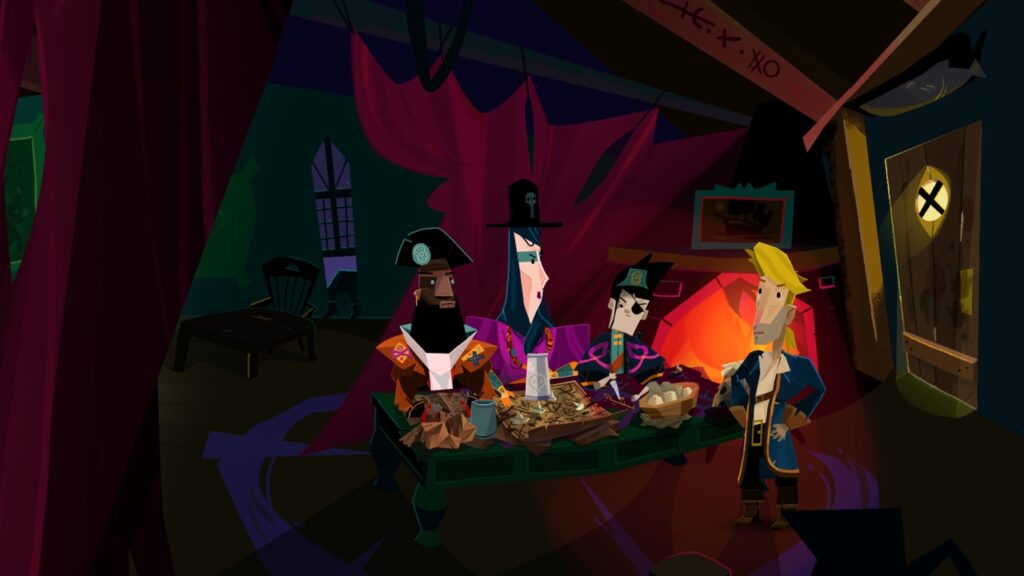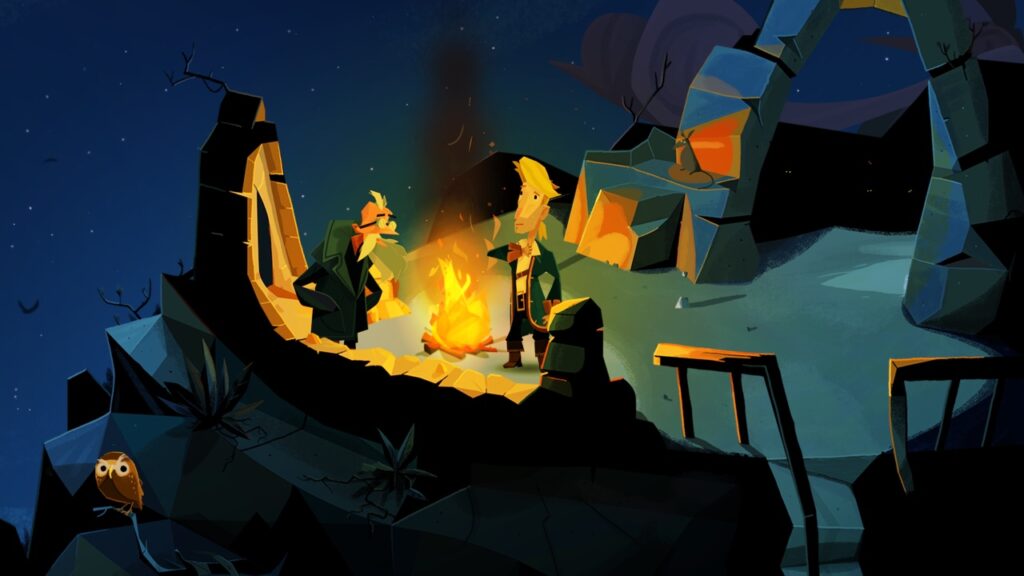They say you can’t go home again, but with Guybrush Threepwood’s spectacular Return to Monkey Island, Ron Gilbert and Dave Grossman would beg to differ.
Some returns are happier than others. Go ask Alice, who, in Alice: Madness Returns, imagined herself back in the nightmarish Wonderland. Or B.J. Blazkowicz, who felt grimly compelled, in Return to Castle Wolfenstein, to do just that, in order to dam a tide of zombified Nazis. On the other hand, there is Donkey Kong. Look at him, in Donkey Kong Country Returns, sporting a carefree grin, as though reliving the past were a barrel of laughs. Then there is Guybrush Threepwood, the hero of Return to Monkey Island, who would sympathise with all three. His voyage is fuelled by no shortage of madness, the vessel that bears him is crewed by the undead, and there is no denying his glee as he wades ashore.
“Hellooooo, Monkey Island,” he says. “It’s me, Guybrush! Did you miss me?”

Thankfully, your enjoyment of Return to Monkey Island will not solely depend on your answer to that question. If your relationship to these point-and-click adventures – which began in the early nineties under the aegis of LucasArts – is one of love and semi-religious devotion, then the chances are you can rejoice. Or at least relax. Series creator Ron Gilbert serves as director and co-writer, partnering with Dave Grossman. Gilbert, Grossman, and a third man, one Tim Schafer, worked on the first two games, The Secret of Monkey Island and Monkey Island 2: LeChuck’s Revenge, a pair that many consider the high water mark not just of the series but of the entire genre.
If, however, you are fresh to these games, you will find much here to divert; the tale is salted with gags, and the puzzles are rarely unsavoury in their difficulty. (I recommend Hard mode, which, despite the boasts on the menu – “More puzzles! Harder puzzles! The full monkey!” – is a fine balance.) More than anything, you have the chance to acquaint yourself with one of the best heroes that games have given us. Once again, Guybrush is voiced by Dominic Armato, who has, since The Curse of Monkey Island, managed to convey the essential Threepwovian qualities. These are as follows: ambition, self-interest, an unslakable thirst for riches, a weakness for love, and somehow, beneath it all, an implied and impregnable decency. What about a moral centre? “I’ve got one of those,” he says, “it’s just kind of small and off to one side. Like a hangnail.”
These are precisely the same traits, incidentally, that define Nathan Drake, the star of the Uncharted games. And it’s no surprise that Naughty Dog, working within a genre that demands a steady supply of bullets and bodies, looked to Monkey Island for a lesson in lightening the mood. The fact is, ever since Guybrush strode through a stone archway, in 1990, and announced, “Hi! My name’s Guybrush Threepwood, and I want to be a pirate!,” you knew that the word was being held in quote marks. Gilbert was an ironist of the piratical, remaining perennially small and off to one side, the better to smirk at the entire affair. That Guybrush should prove such good company, after all these years, is down to Gilbert, whose efforts to lampoon spring from a place of endless love.

Evidently, that love hasn’t dimmed. That is why, near the beginning of Return to Monkey Island, we get a trove of tributes to the first game. The camera, hanging in a purplish night sky; a pair of subtitles, “Deep in the Caribbean” followed, after a pause, by “The Island of Mêlée”; and Guybrush stepping through the very same stone arch. What has he been up to, someone asks. “Oh, you know. Freebooting mostly. Swashing buckles and so on.” At the outset, I worried whether the new game would hang a little too fast to its forebears, walking the narrow plank of the past until it creaked. I began to relax when I realised that Gilbert was wise to that worry; hence the gloating declaration of the game’s villain: “Soon not even the stench of your passing will remain, as the world moves implacably onward.” It’s a great line, loaded with wry self-deprecation. After all, the world moved implacably onward from the genre, and you can feel Gilbert and Grossman pointing to their work and hoping that it still clicks.
It does. This is due, in part, to the puzzles. These consist of combining items in your inventory with parts of the environment, and they require just the right amount of lateral thinking. For years now, adventures such as The Walking Dead and Life is Strange have been lateralose-intolerant, for fear that the narrative flow might clot should we become stuck. But the benefit of abstruse puzzle design, back when LucasArts held sway, was the thickening of narrative illusion; far from taking us out of the fiction, we took the fiction with us after we had stopped playing, dreaming up solutions over dinner. Plus, nothing beat those occasions on which you hatched a slightly out-there way to crack a conundrum, only for the game to accomodate you. All of a sudden, its world was richer, the possibilities wilder.

The world of Return to Monkey Island may be the wildest yet. The plot is recounted by Guybrush, who sits on a bench with his son, Boybrush; thus, the whole thing has the flavour of grogged regalement. In brief: LeChuck, the skull-faced menace of previous entries, is up to his old tricks, and Threepwood must travel to Monkey Island to uncover the secret that eluded him long ago. But the wildness has more to do with the art style, by Rex Crowle. Gone is the pixelated look of the originals, and the Bluthish warmth of The Curse of Monkey Island; instead, we get spiky colours, scribbles of hair, and beady eyes like dabs of black marker pen. It is similar to Crowle’s work on Tearaway – that ode to the lick-and-stick joys of paper – and, most of all, to Knights and Bikes.
That game spun around two young girls, who, while beached in the drizzly boredom of a Cornish caravan holiday, liked to pretend that their afternoons were encrusted with Arthurian legend. Crowle brings that same scrawled brightness to the new game, and with it the same conviction that the make-believe can happily enfold the humdrum. Series veterans will, perhaps, baulk at the new look, but, like it or not, it reaches, much like Guybrush, to the heart of Monkey Island.

And what is that heart? For that matter, what is the secret? Toward the end of Return to Monkey Island, we get a few mocking suggestions, the cheapest of which is a chest “filled with gems, rubies and gold,” the funniest that “The secret was really the friends we made along the way.” The joke being that it isn’t a joke at all. Longtime fans will be gratified at seeing Elaine, Guybrush’s old flame and now his wife; Carla, the old sword master turned governor; and Stan, the used-boat salesman, whose arms wave and jerk in a flagless semaphore. Gilbert is gathering together the hits of his tenure with the series (after the second game, he departed, though he contributed to Tales of Monkey Island, in 2009), insuring, in other words, that we get the full monkey.
But there is something else here, other than the puzzles, the witty script, and the exquisite music, by Michael Land, Peter McConnell, and Clint Bajakian. A zephyr of wistfulness blows through it, and it has to do, of course, with time. Consider the figure of Boybrush, who, with a bouncy dollop of blonde hair and a miniature blue jacket, is the spit of his tired father. Gilbert is looking back, to his golden days at LucasArts, and to the swells and currents of his career ever since. He may not be able to navigate back there – none of us can – but it doesn’t matter. History drifts back to port, and a new generation is dying to know the secret.
“A lot of your stories don’t feel like they’re finished at the end,” says the lad, to his father. We’ll see.
Game: Return to Monkey Island
Platform: Nintendo Switch / PC
Developer: Terrible Toybox
Publisher: Devolver Digital
Release Date: September 19, 2022






